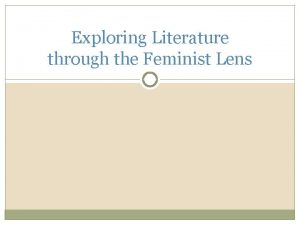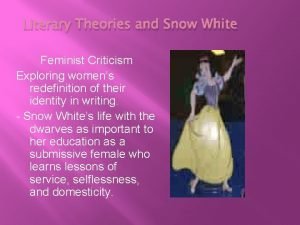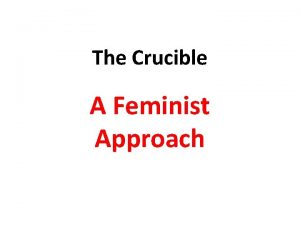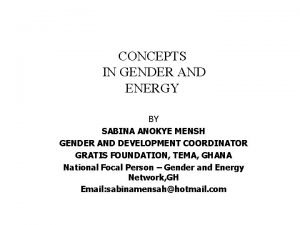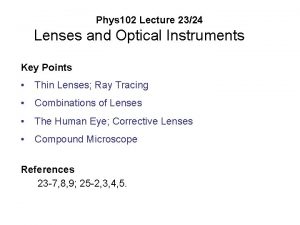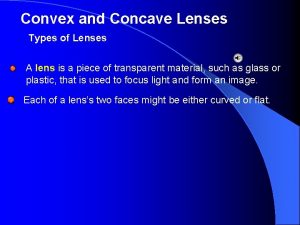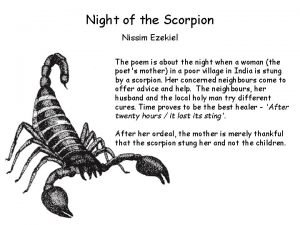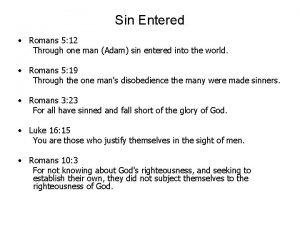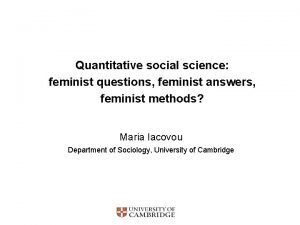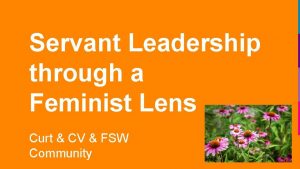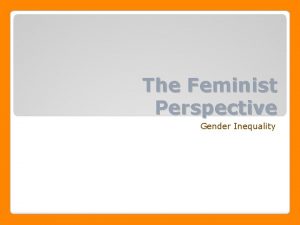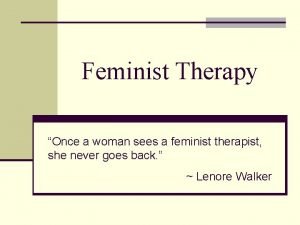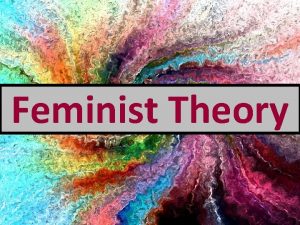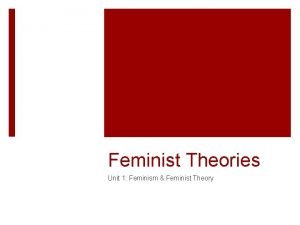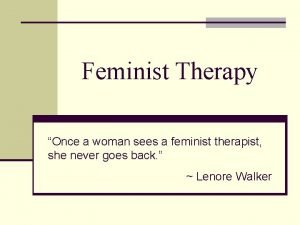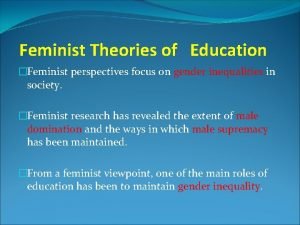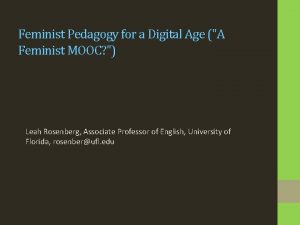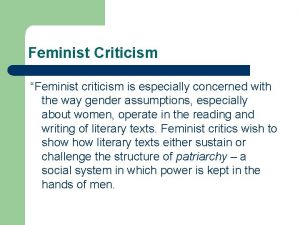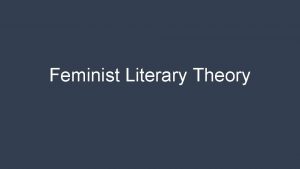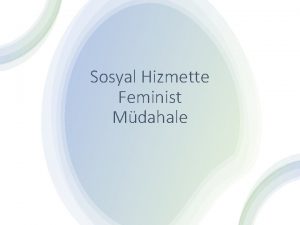THROUGH THE FEMINIST LENS FROM FEMINIST TO GENDER
























- Slides: 24

THROUGH THE FEMINIST LENS FROM FEMINIST TO GENDER HISTORY

MARY BEARD 1946 Ann Summers JOAN SCOTT 1974 -2007 1975 THE CHANGING FACE OF FEMINIST HISTORIOG RAPHY 9/21/2021 NATALIE ZEMON DAVIS MIRIAM DIXON 1980’S-90’S 1976 template from www. brainybetty. com copyright 2006 2

Ann Curthoy and John Docker THE FEMINIST CHALLENGE 1980’s onwards Gender historiography 60’s, 70’s Feminist historiography Mary Beard 9/21/2021 • Gerda Lerner criticized feminist scholarship for topically narrow, descriptive and devoid of interpretation. She warned against seeing women as a unified group, using analogies with other groups eg slaves or economi 9 cally deprived • Gender replaced patriarchy as category of historical analyses • Simone De Beauvoir The Second Sex ( philosophy) • Women’s subjection not just economic or political but embedded in the fabric of Western Thought • Link between feminist movement and historians strong. They were often activists as well eg Anne Summer • Women as Force in History 1946 • Questioned the proposition that women were members of a subject sex throughout History template from www. brainybetty. com copyright 2006 3

Bonnie Smith on the dual tradition • “Historical writing was not so much all male as profoundly gendered, split between an almost entirely male world of professional academic history and a parallel world of amateur history in which both men and women had an important place…. producing works of historical fiction, local histories and family histories. ” 9/21/2021 template from www. brainybetty. com copyright 2006 4

Mary Spongberg Writing Women’s History since the Renaissance • “ In so doing they maintained a separate feminine historical tradition exploring and hybridising genres and developing them for their own purposes; autobiographies, biographies of Holy Women, history of kin, secret history, personal memoirs, anecdotal history, local history, geneology, collections of folklore, journals and letters. ” 9/21/2021 template from www. brainybetty. com copyright 2006 5

FORMATIVE IDEOLOGICAL INFLUENCES MARXISM Eric Hobsbawn ANNALES Interdisciplinary approach POST MODERNISM Foucault, Derrida EXTERNAL SOCIAL CONTEXT OF THE FIRST AND SECOND WAVE FEMINIST MOVEMENT 9/21/2021 template from www. brainybetty. com copyright 2006 6

The dual nature of the feminist legacy Gender history is about gender issues in society 9/21/2021 Gender history is a perspective over all areas of history template from www. brainybetty. com copyright 2006 historiography 7

GERDA LERNER • “ Too great a focus on oppression returns the historian to the study of the actions of men, or more precisely to a male defined conceptual framework. ” 9/21/2021 template from www. brainybetty. com copyright 2006 8

SUSAN PEDERSON AMERICAN HISTORICAL ASSOCIATION • “If we take feminism to be that cast of mind that insists that the differences and inequalities between the sexes are the result of historical processes and are not blindly "natural, " we can understand why feminist history has always had a dual mission— on the one hand to recover the lives, experiences, and mentalities of women from the condescension and obscurity in which they have been so unnaturally placed, and on the other to reexamine and rewrite the entire historical narrative to reveal the construction and workings of gender. ” 9/21/2021 template from www. brainybetty. com copyright 2006 9

DAMNED WHORES AND GOD’S POLICE Anne Summers 1975 • An active feminist of the 1970 s, who worked as a political adviser to Prime Minister, Mr Paul Keating. From 1983 to 1986 she was First Assistant Secretary of the Office of the Status of Women, Department of Prime Minister and Cabinet. Summers was a cofounder of the women's studies journal Refractory Girl and of a number of books including Damned Whores and God's Police: The Colonization of Women in Australia. • Summers theme is that society segregates those who accept their traditional roles ( God’s police) and those who buck them ( Damned Whores, prostitutes, single mothers and feminists). God’s police women are then used to maintain the status quo by socializing the young in homes and education into accepted obedience and further ostracism of Damned Whores. 9/21/2021 template from www. brainybetty. com copyright 2006 10

THE REAL MATILDA Miriam Dixon 1976 • This book traces the origins, derivations and formation of Australian male/female, black/white, convict/free interaction patterns but within the context of a patriarchal /fratriarchal( heavily Irish)society. It draws on official papers, literature , newspaper and anecdotal evidence. Dixon also draws on psychoanalyses in the childhood gendering influences • Her founding interest is the place of women in the national identity 9/21/2021 template from www. brainybetty. com copyright 2006 11

Natalie Zemon Davis A LIFE OF LEARNING lecture 1997 • Professor Davis, has taught courses in early modern France at Michigan, Toronto, California, Paris, Oxford Princeton and has pioneered interdisciplinary courses in history and anthropology, history and film and history and literature, the study of women and gender and the history of the Jews in early modern Europe 9/21/2021 template from www. brainybetty. com copyright 2006 12

BRIEF BIO • Born of Jewish Immigrants in Detroit Michigan • Received PHD in 1959 • Married at 19 to Chandler Davis, a mathematician, 3 children • Her works include; • Society and Culture in Early Modern France 1975 • The Return of Martin Geurre 1983 - the basis for a film • Fiction in the Archives 1987 • Women on the Margins; Three Seventeenth Century Lives 1995 • Acknowledges Marxism, Annales and Feminism as formative influences 9/21/2021 template from www. brainybetty. com copyright 2006 13

Sources • She makes use of numerous sources such as judicial records, plays, notorial records, tax rolls, early printed books and pamphlets, autobiographies and folk tales. She is a proponent of cross-disciplinary history, which consists of combining history with disciplines such as anthropology, ethnography and literary theory 9/21/2021 template from www. brainybetty. com copyright 2006 14

Women on the Margins • In her Women on the Margins (1995), she looked at the autobiographical accounts of three 17 thcentury women ; • the Jewish merchant Glikl Hamel, • the Catholic nun Marie de l’Incarnation, who came to New France, and • the Protestant entomologist-artist Maria Sibylla Merian—and discussed the role of religion in their lives. 9/21/2021 template from www. brainybetty. com copyright 2006 15

CRITICISM • She opened her Women on the Margins with an imaginary dialogue, in which her three subjects upbraid her for her approach and for putting them in the same book. • Some critics of her work find this troubling and think that this practice threatens the empirical base of the historian’s profession. Davis’s answer to this is suggested in her 1992 essay “Stories and the Hunger to Know, ” where she argues both for the role of interpretation by historians and their essential quest for evidence about the past: both must be present and acknowledged to keep people from claiming that they have an absolute handle on “truth. ” 9/21/2021 template from www. brainybetty. com copyright 2006 16

Leon Africanus • http: //www. youtube. com/watch? v=Wg. Fq. I 2 _t. NTk 9/21/2021 template from www. brainybetty. com copyright 2006 17

BRAIDED HISTORIES An Herodotean Allusion? • 18 th-century Suriname studies networks of communication and association among families, both slave and free, on the plantations of Christian and Jewish settlers. 9/21/2021 template from www. brainybetty. com copyright 2006 18

Joan scott • The Glassworkers of Carmaux: French Craftsmen and Political Action in a Nineteenth Century City (Harvard University Press, 1974); • Women, Work and Family (coauthored with Louise Tilly) (Holt, Rinehart and Winston, 1978); • Gender and the Politics of History (Columbia University Press, 1988); • Only Paradoxes to Offer: French Feminists and the Rights of Man (Harvard University Press, 1996); • Parité: Sexual Difference and the Crisis of French Universalism (University of Chicago Press, 2005) and • "The Politics of the Veil" (Princeton University Press, 2007 9/21/2021 template from www. brainybetty. com copyright 2006 19

BIO • Joan Wallach Scott (born December 18, 1941) is an American historian of France with contributions in gender history and intellectual history. She is currently the Harold F. Linder Professor at the School of Social Science in the Institute for Advanced Study in Princeton, NJ. 9/21/2021 template from www. brainybetty. com copyright 2006 20

• http: //www. youtube. com/watch? v=Mrknw. N l 818 • 9/21/2021 template from www. brainybetty. com copyright 2006 21

GENDER A Useful Category for Historical Analyses • • 9/21/2021 “ the history of the term “gender” as different from “sex” — particularly as it applies to socially-constructed rather than biologically-determined distinctions. Interest in gender (and class and race) as a category of analysis developed in the 1970 s among feminist social historians as a way of broadening the historical field using different theoretical perspectives and for different objectives. To Scott however, gender is most powerful as “a primary way of signifying relationships of power” when it exposes how political discourse has used gendered terms and references to create meaning, by defining occupations and familial, political, and social roles as masculine or feminine to create natural hierarchies or oppositional relationships” , " Joan Scott argues that the study of gender must go beyond the study of women. She argues that gender analysis must encompass gender's role in constituting social relationships more broadly and in signifying other relationships of power. template from www. brainybetty. com copyright 2006 22

Jill Matthews 2002 “Good History” • “ By good I mean…recognizing that sometimes gender does not matter; that the presence or absence of women sometimes does not matter; that the fact of someone being a man or a woman may not be the most important thing about them and their behaviour. It means sometimes using gender as a tool to analyze other more important historical categories, rather than making it the central issue. ” 9/21/2021 template from www. brainybetty. com copyright 2006 23

STARKEY FOOT IN MOUTH • "If you are to do a proper history of Europe before the last five minutes, it is a history of white males because they were the power players, and to pretend anything else is to falsify. " • "But it's what you expect from feminised history, the fact that so many of the writers who write about this are women and so much of their audience is a female audience. Unhappy marriages are big box office. " 9/21/2021 template from www. brainybetty. com copyright 2006 24
 Gender lens literature
Gender lens literature Feminism in snow white
Feminism in snow white The crucible feminist lens
The crucible feminist lens Strategic gender needs and practical gender needs
Strategic gender needs and practical gender needs Lens formula
Lens formula Fresnel and fraunhofer diffraction
Fresnel and fraunhofer diffraction Converging lens is concave or convex
Converging lens is concave or convex Holle lens
Holle lens Night of scorpion poem
Night of scorpion poem Through one man sin entered
Through one man sin entered Furcation classification
Furcation classification Tangent-sawing
Tangent-sawing Môn thể thao bắt đầu bằng từ đua
Môn thể thao bắt đầu bằng từ đua Sự nuôi và dạy con của hươu
Sự nuôi và dạy con của hươu điện thế nghỉ
điện thế nghỉ Biện pháp chống mỏi cơ
Biện pháp chống mỏi cơ Trời xanh đây là của chúng ta thể thơ
Trời xanh đây là của chúng ta thể thơ Chó sói
Chó sói Số nguyên tố là số gì
Số nguyên tố là số gì Thiếu nhi thế giới liên hoan
Thiếu nhi thế giới liên hoan Fecboak
Fecboak Các châu lục và đại dương trên thế giới
Các châu lục và đại dương trên thế giới Một số thể thơ truyền thống
Một số thể thơ truyền thống Thế nào là hệ số cao nhất
Thế nào là hệ số cao nhất Hệ hô hấp
Hệ hô hấp
